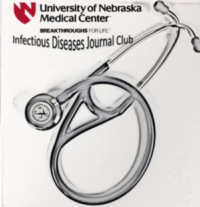On 10/17/2017, Dr. Ashraf discussed an interesting study during UNMC Infectious Diseases Division Journal Club. The study entitled, “Empirical Antibiotic Treatment Does Not Improve Outcomes in Catheter-Associated Urinary Tract Infection: Prospective Cohort Study” was conducted in Israel and published in the Journal Clinical Infectious Diseases in August 2017.
In this prospective observational cohort study, the authors studied the outcome of adult patients with indwelling urinary catheters who were diagnosed with catheter associated urinary tract infections (CAUTI). This cohort consisted of 315 elderly patients with mean age of 79.2 + 11.5 years. Close to a third (30.8%) of patients in this cohort died within 30 days (all-cause mortality) and median survival time of the cohort was only 82 days.
Nearly half of this cohort (49.2%) received appropriate empiric antibiotic coverage within 48 hours of either admission to hospital (if infection was acquired outside of the hospital) or collection of urine culture (if infection occurred during the hospital stay). Interestingly, appropriate early empiric antibiotic treatment (within 48 hours) had no statistically significant association with 30 day mortality {propensity score-matched odds ratio 1.39 (0.76-2.55)}. Similarly, appropriate empiric antibiotic treatment had no statistically significant association with long-term survival in the propensity-matched cohort (hazard ratio, 0.99, 95% confidence interval 0.75-1.3)
The authors of this study acknowledged that the findings of the study are at odds with several published studies that shows mortality benefit when appropriate antibiotic is used early in severe bacterial infections. Whether the difference is related to the fact that it is difficult to distinguish between symptomatic urinary tract infection and febrile illness from another etiology is unclear. Another possible explanation is that this cohort consisted of very old patients with high prevalence of multi-drug resistant organism that was at high risk of mortality even at the baseline. The authors suggested that the use of antibiotic in patients suspected of CAUTI can be deferred until better understanding of the fever cause and sepsis trend and culture results should be used for directed antibiotic treatment.
This study sparked a lot of spirited discussion at Journal Club. Even though this study opens up a new way to approach older patients presenting with CAUTI, we may need further studies that can validate these findings. We may also need to identify sub-group of patients within this patient population, if any, who may benefit from early appropriate antibiotic treatment. Another important question that we should ask is what should be considered early appropriate antibiotic treatment. Whether 48 hour is a good cut off to define early appropriate antibiotic coverage or should it be much less than that. We will be looking forward to finding these answers in future studies. Read more about the study discussed here.
Content courtesy Dr. Salman Ashraf
Photos courtesy Jonathan Nguyen

Dr. Salman Ashraf discussing his article

Dr. Kelly Cawcutt engaging the group discussing the article from an Infectious Disease/Critical Care Medicine perspective
